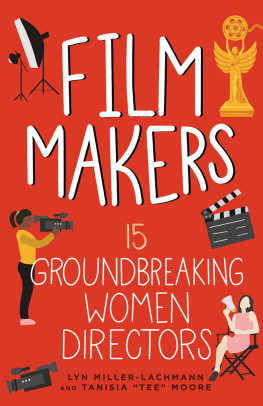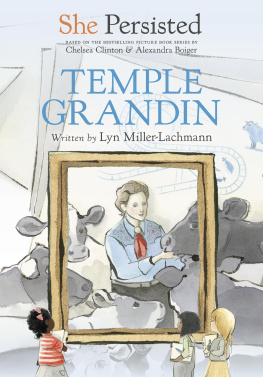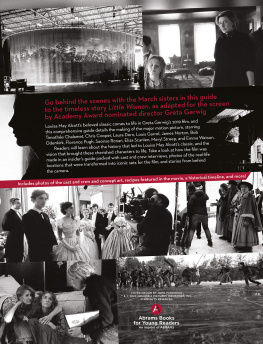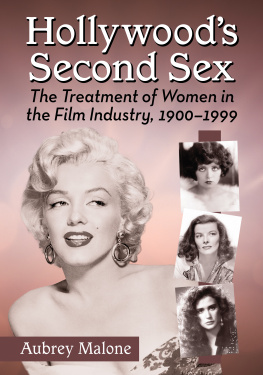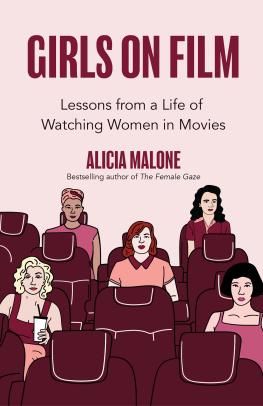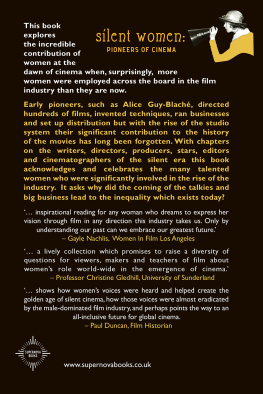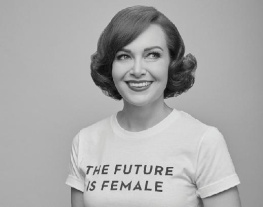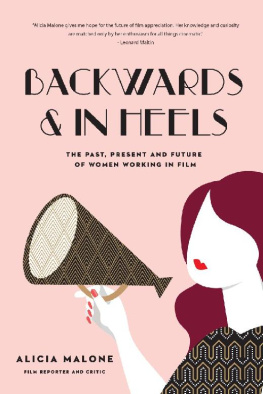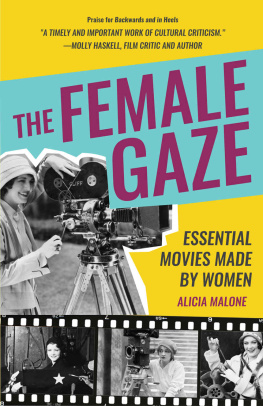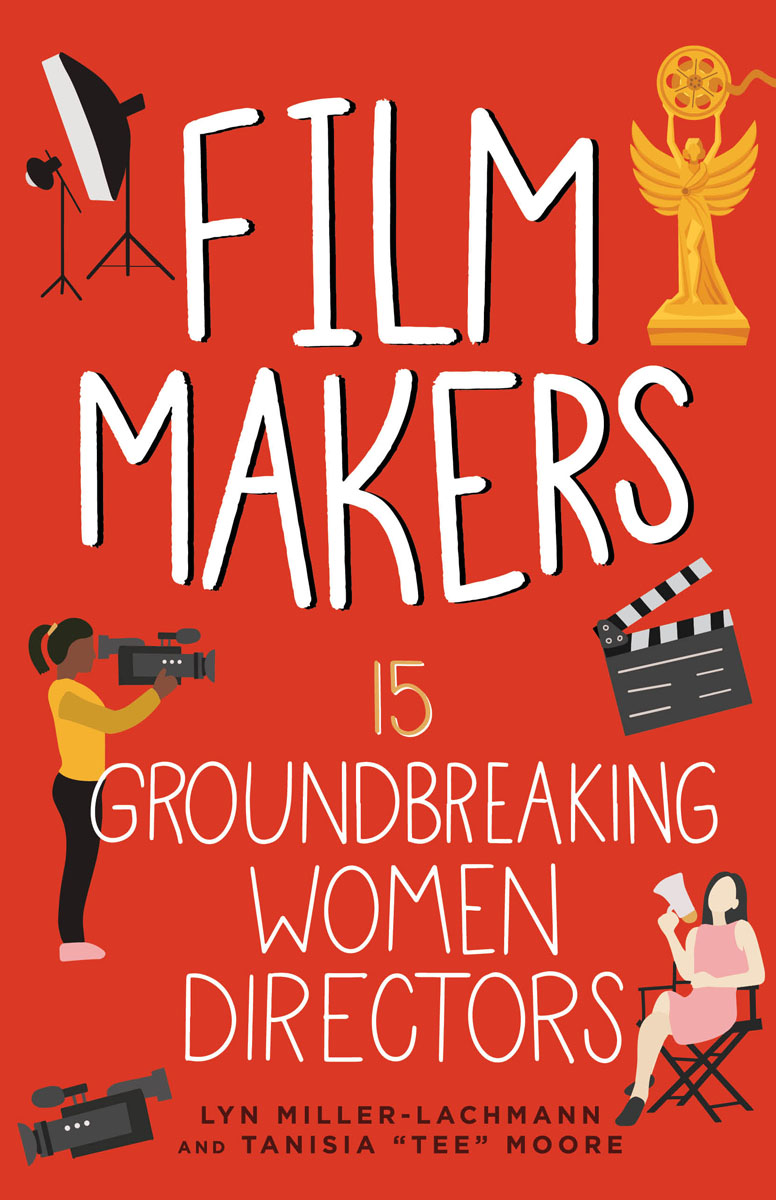
Copyright 2022 by Lyn Miller-Lachmann and Tanisia Moore
All rights reserved
Published by Chicago Review Press Incorporated
814 North Franklin Street
Chicago, Illinois 60610
ISBN 978-1-64160-610-3
Library of Congress Control Number: 2022934946
Cover, illustrations, and interior design: Sadie Teper
Printed in the United States of America
5 4 3 2 1
For my grandmother, whose artistic dreams showed me I could live my own.
Lyn
For my forever muses, Syd, Savvy, and Jay Mommy loves you all. Forever and always.
Tee
Contents
Introduction
In his well-known song, James Brown acknowledges that the world wouldnt be quite the same without a woman. Simply put, theres something powerful a woman brings to the table. In the past four decades, todays women filmmakers have dared to create stories that their male counterparts deemed too risky, too intimate, or too big. When the COVID-19 pandemic closed down schools, businesses, and communities, these women directors didnt stop working. They kept their crews and actors safein some cases going to extraordinary lengths to do sowhile producing films that entertained and enlightened the masses of people trapped in their homes.
Yet oftentimes women are faced with strong opposition and barriers that attempt to keep them boxed into specific roles: the assistant working behind the scenes, receiving little or no credit; the arm candy valued for appearance rather than creativity, intelligence, or drive; the writer or director pushed to explore domestic topics when her dream is to make films about social upheaval, revolution, and war. But as this book will show, living outside this box is way more fun.
When Jane Campion, Agnieszka Holland, and Kathryn Bigelow began making films in the 1970s and 80s, women directors were a rarity. In 2010 Kathryn became the first woman in the decades-long history of the Academy Awards to receive the Oscar for Best Director, winning for The Hurt Locker. Sixteen years earlier, Jane was only the second woman nominated for that award, and her film, The Piano, did not win. And Chlo Zhaos independent film Nomadland, released in 2020, won Best Picture and Best Director at the 2021 Oscars and Golden Globes, making her the first woman of color to garner these prestigious prizes.
According to a report conducted by San Diego State Universitys Center for the Study of Women in Television and Film, women comprised 21% of all directors, writers, producers, executive producers, editors, and cinematographers working on the top 100 grossing films in 2020 in the United States. However, the film industry has a long way to go in giving womenparticularly women of coloran equal shot at the directors chair and other important positions behind the scenes. Hollywood has made great strides in showing diversity on set, casting more BIPOC (Black, Indigenous, and People of Color) actors, and while that is to be celebrated, the film industry still lacks diversity when it comes to directors, writers, and studio executives. Twenty-one percent is far from the fifty-one percent of women that represents the US population.
So how does one challenge this? By pushing back against the status quo in order to demand change. Ava DuVernay created a personnel database for Hollywoods below-the-line crew members designed to amplify women, people of color, and other underrepresented film and television professionals. One-on-one mentorship has served as another avenue for increasing the presence of women directors, particularly for women who are locked out of film programs due to a lack of money or who receive less attention in those programs because of their gender. Greta Gerwig credits a number of women directors who mentored her after she was rejected from multiple MFA programs and had to enter the industry through acting, rather than writing and directing as she had desired; she, in turn, is mentoring the young women who act in her films. Shonda Rhimess shows inspired or directly launched the careers of other Black women filmmakers, such as Gina Prince-Bythewood and Issa Rae.
Each of the women profiled in the following chapters has faced some form of adversity in her career. The rejections these women faced created within them a commitment to keep pushing forward and to not allow a no to extinguish their passions.
Some of the women have escaped persecution from governments who were uncomfortable with their storytelling and wanted to silence them. For years, under the Communist regime in Poland, Agnieszka Holland was not credited for the work she did behind the scenes as a cinematographer and assistant director, because her father and she had run afoul of the authorities. She had to flee Poland in 1981 and start over in a new home, speaking a new language, in order to come into her own as a director. Two generations later, Chlo Zhaos parents sent her from China out of fear that her defiance of ancient traditions and modern rules would get her, and them, in trouble. Her work continues to face censorship in the country of her birth. These brave women filmmakers knew that their stories had to be shared so the next generation of young women would know that their voices matter and deserve to be heard.
Black women have especially played a major role in raising visibility and creating opportunities for themselves and other women of color, and the biographies in this volume reflect that role. Pioneering director Ava DuVernay explored the United States struggles for racial justice in the documentary 13th and docudramas Selma and When They See Us. Showrunners such as Shonda Rhimes have offered an entry point for younger women in the industry as they demonstrate to a white-dominated industry that Black stories sell. Dee Rees came out as gay while in film school in her late 20s, and she now confronts in her films the challenges of being both Black and LGBTQI+. Issa Rae has struggled with her identity as a Black woman who grew up in both US and Senegalese cultures.
This sense of living between two cultures informs the work of other filmmakers of color who bring forth fresh perspectives and universal truths. Lulu Wang was born in China but immigrated to the US at the age of six; her film The Farewell explores how these two cultures clash when a family is faced with a serious health crisis. Petra Costa moved to New York City from Brazil against her mothers wishes after her older sister perished on the same journey 13 years earlier; her documentary Elena is a poetic tribute to her sister as well as plea to end the silence about suicide.
The careers of the 15 women filmmakers featured in this volume highlight a final theme that we explore: the range of their work, from documentaries and independent films to Hollywood blockbusters and popular TV shows. While some of the directors have made the switch from the art house to the megaplexfor instance, Chlo Zhao followed up Nomadland with Eternals, set in the Marvel universeothers go back and forth between film and TV work and between indie films and big-budget productions. Several of the directors have achieved critical and commercial success with adaptations of classic childrens books, such as The Secret Garden (Agnieszka Holland), Little Women (Greta Gerwig), and A Wrinkle in Time (Ava DuVernay). In each case, the director put her spin on the book, as Ava cast the characters of Meg and her family with mostly Black actors, and Gretas Little Women
Next page
